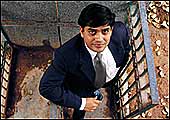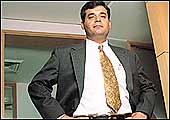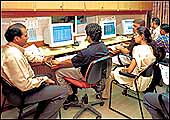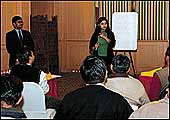 |
 |
 |
| Fresh view: (L to R) Puneet
Singh, Manisha Deva and Uday Chawla are bringing in their domain
skills to head-hunting |
They
haven't done the drill. They haven't spent their early-20s listening
in rapt attention to some stern know-it-all droning on about the
power of human resource (hr) mobilisation, and certainly don't think
flaunting any such regimental badge of training has any bearing
on their career. And yet, they continue to shake up the Indian business
of talent scouting with their success.
Meet the young and energetic head-hunters who've
made their way in from outside the hr stream, the few who are in
their chosen field for a far more compelling reason: passion. A
passion developed under the grown-up influence of worklife maturity.
A passion for talent, and its use for maximum impact.
Tis Under HR... Says Who?
Uday Chawla, 40, Managing Partner at the search
firm Heidrick & Struggles (H&S), was an entrepreneur for
10 years, having started a telecom firm, before moving to TMI India,
the domestic arm of a Danish change management outfit. The experience
gave him key insights into the telecom-software space. So, five
years ago when he got the chance to be part of H&S' start-up
team in India, it was something "no one in his right mind would
say 'no' to", he laughs. "The industry is slowly maturing,"
he thinks, "and contrary to popular belief, hr is just one
competency in a list of many others needed for the job." Apart
from domain knowledge, he brings an understanding of work cultures,
a wide network and specialised interviewing skills.
Unlike Chawla, Manisha Deva, 32, was quite
cold to the idea of shifting to the search business at first. She
was doing well at The Oberoi, Mumbai, looking after corporate marketing
and financial services. But Korn Ferry pursued her diligently, and
once she succumbed to the offer, she found herself suddenly excited
and successful as a domain expert (financial services) in her new
career. She brought her rolodex along, of course ("it would
be suicide to lose the contact base"). The importance of being
from the outside, she says, is that you know of "the movers
and shakers in a particular domain".
At 29, Puneet Pratap Singh of Executive Access
is proud of different things. Three things, in particular: not being
from a premier B-school (he went to IIPM in Qutab Institutional
Area, Delhi), not being an hr man (finance and marketing interested
him more), and being "the youngest senior consultant in the
industry". He was on the road 23-days-a-month selling Global
Information Systems Technology's offerings in remote Himachal Pradesh,
before he turned head-hunter. "People excite me," he found,
and got an added kick from the prospect of interacting with many
CEOs-and that too, on their career growth for a change.
To Singh, conventional hr is a bore. Where
conventional hr people tend to be weak, he feels, is in business
development, which is a highly competitive game. "This is not
the place for non-performers who got lost and hope to find themselves
as head-hunters," he quips. It's a challenge-one to do with
business as much as people-involving some really fine judgements.
Having played a role in some 100 switches over the past year, Singh
is confident of having got into the heads of both the hunters and
the hunted. "A career is like a game of chess," he philosophises,
whilst talking about a particularly complex long-in-the-making deal,
"to move a rook backwards is not losing the game."
| Unconventional HR professionals bring a new
distanced perspective to head hunting |
Finer Judgements
Job dealings are never easy. "Sometimes
clients need a gentle nudge," believes Azra Hameed of Gilbert
Tweed India, "and somebody objective who they look at for leadership
during delicate negotiations." Just a few years ago, she thought
of head-hunters simply as people who recruit the "top Cs"
for companies. A mother of two, she was an entrepreneur running
(along with her husband) an information technology company. After
10 years of that, and then Boston Education and Software Technology,
when she sought a fresh challenge in the same vertical it space,
she found she could leverage her rolodex to win business for Gilbert
Tweed. She currently has AOL, Accenture, GreenPoint and BankAm as
clients.
As for the hr skills required, she's been picking
up threads along the way. She's proud of the work she's done for
discerning clients (such as Accenture), but she's equally candid
about moments of embarrassment (such as when a candidate let her
down at a crucial point).
"Disappointments can be avoided if you
completely comprehend the candidate's motivations," says Sanjay
Kapoor, Partner, Amrop International, "but, of course, everybody
is shrewd and human." He is no hr man either, and the big value
he brings to the business, as he says, is a well-developed sense
of empathy, coming as he does from the same side as his candidates.
The task, in his view, is to "connect with the candidate's
aspirations". This takes skills of human touch and detection.
After a career in the banking and power sectors,
Kapoor turned head-hunter 18 months ago. Why? To gain the fulfillment
of "watching individuals grow".
Meaning Of Merit
A fresh entrant to a field often has the advantage
of a distanced perspective. Conventional hr professionals, it may
be argued, are creatures of conventional corporate hierarchy and
all the internal intrigue that goes with it. If so, they are possibly
less merit-attuned in matters of job candidacy than actual value-generators
who're bothered about business results above all else.
That could leave hr professionals stung. Conventional
hr is not all there is, argues Anil Segal, who has 16 years of hr
experience working with ITC, Xerox and American Express, and describes
himself as "temperamentally not an hr person". He is currently
the chief of Proactive Consultants, a search firm based in Gurgaon,
and believes that culture maintenance men often make lousy head-hunters.
"Entrepreneurs or sales and marketing people," says Segal,
perform best, "as they understand the importance of delivery."
But where does that leave hr as a discipline?
Isn't recruitment a key performance area? Well, says Segal, it all
depends on the man on top. "HRD is only as strong as the CEO
makes it," says Segal, leaving no doubt where the real responsibility
lies.
 |
| Tickle bones's: Comedian Vir Das rakes
in the moolah |
LATEST
Getup, Standup
You
stand up, they roll off their chairs in mirth. You pause...and then
swish, turn your head round quick-to catch your own halo, and again,
darn, in vain. They're in peals. Have the nerve, the bone, humerus
fibia or whatever? Be a stand-up comedian. People would pay more
than your weight in sliced bread to have you at private gatherings.
According to Vir Das, who rakes it in tickling Delhi's social circuit,
there's opportunity in "a wider variety of audience asking for comedy
hours on the Idiot Box". But are you funny enough to crack big-time?
Well, try the absurdity test: try your surroundings. The rewards?
"When it rains, it pours," quips Das, "and when it's dry, it's a
desert."
COUNSELLING
Help, Tarun!
 I'm
working as an accounts assistant at a state-owned insurance company
since 1995. With an MBA in finance from a reputed university in
Tamil Nadu, I'm better qualified than my peers. But I haven't been
promoted all these years because my peers have more work experience,
and my organisation promotes people on seniority basis. I'm totally
frustrated and am thinking of changing jobs. Should I? I'm
working as an accounts assistant at a state-owned insurance company
since 1995. With an MBA in finance from a reputed university in
Tamil Nadu, I'm better qualified than my peers. But I haven't been
promoted all these years because my peers have more work experience,
and my organisation promotes people on seniority basis. I'm totally
frustrated and am thinking of changing jobs. Should I?
It depends on what you are looking for. If you join a large professional
organisation, you have to compete with CAS and MBAs from reputed
institutes, which can be tough. Not being promoted is frustrating,
I agree, but promotions are given not just on the basis of qualifications;
performance also matters. Also, your current job gives you job security,
which you may not get elsewhere. It will be better for you to carefully
analyse your long-term goals and growth prospects before taking
a decision.
I'm having problems charting a sound career
path. At present I am a consultant at a small firm, having done
my MBA in finance. Prior to this, I did a diploma in Hotel Management
and worked for four years in F&B production (kitchens) in good five-star
hotels in India and the Gulf. But it was low-paying and slow-moving,
so I moved on. Interviewers are however not convinced about my reasons
for this move, and even I am not sure what I should do next. Please
advise.
Quite frankly, you can't blame the interviewers
if you are not sure yourself about your career moves. Given that
you took four years to decide you didn't want a career in hotels,
they are bound to be queasy about your intentions. What you need
to do first is talk to yourself and find out what you really want.
If you are convinced, you can convince others. At the moment it
appears to me that you did an MBA in finance not because you were
interested in it, but because you wanted to move away from hotel
management. But if you feel that the MBA was the right thing for
you to do, then just forget the past and start exploring the options
around you. Unless you are allergic to hotels, you could look at
cashing in on your hotel management/MBA finance combo. Hotels also
need finance people, you know.
I am a 29-year-old M.Sc. graduate with
an MBA in marketing. For the last two years, I've been working as
a sales and marketing executive with a top distributor in Karnataka.
But I have a problem of stammering. It doesn't happen normally,
but only when I speak with strangers or my superiors. It also happens
when I give job interviews at good companies. Invariably my application
gets rejected. I'm undergoing treatment, but the problem is still
there. It's taking a toll on my peace of mind and my career. How
can I tackle this?
Cheer up; you have something in common with
several great people: Aristotle, Charles Darwin, Marilyn Monroe,
Isaac Newton and Jack Welch, for instance. But seriously, even though
it's unfair, people don't take very kindly to a stammer. Even you
wouldn't like it if a salesman took too long to explain something.
From what you've said, it appears your problem is not genetic but
more of a confidence thing. And that is best cured through scientific
counselling. Look out for a good counselling centre to complement
your medical treatment. Also, you could look for a job that doesn't
require you to meet customers too often.
I am working in the technical process of
a reputed call centre. However, this was not my preferred choice
of work. Being a graduate in mechanical engineering, I wanted to
work in the manufacturing industry, but couldn't get a job. Now
what I am worried about is whether my stint here will be considered
"work experience" when I do get through into manufacturing. Quite
a few of my colleagues are also in a similar quandary. Please tell
us if this experience will count.
It boils down to relevance, really. If the
work you do in your current organisation is relevant to, or similar
to, the work you are likely to do in the manufacturing organisation
of your choice, the experience will surely count. But if the work
is different, your call centre experience is unlikely to count.
But you could also explore other avenues open to you, which may
be more directly related to the kind of work that you are doing
in your current job. If manufacturing doesn't work out, one of these
alternatives may. So, first find out which industries employ people
with your kind of skills.
Answers to your career concerns are contributed
by Tarun Sheth (Senior Consultant) and Shilpa Sheth (Managing
Partner, US practice) of HR firm, Shilputsi Consultants. Write to
Help,Tarun! c/o Business Today, Videocon Tower, Fifth Floor, E-1,
Jhandewalan Extn., New Delhi-110055.
Brokerage
Brimming
They're recruiting
to please the retail investor.
 |
| Cashing in: Retail investments have increased
job options |
Think
stockmarket. Think small. India's brokerage houses are zeroing in
on the retail investor, and are looking for skill sets to demystify
trading. "Being in the service delivery business," says
Tarun Shah, CEO, Sharekhan, "we firmly believe that it is our
people, and people alone, who can create a value proposition by
efficiently delivering services and creating new product offerings."
The challenge is to simplify investing and thus "empower the
investor to make informed decisions". For its part, Sharekhan
hopes to add 100 'sherus' (employees) by the fiscal-end to fortify
its it network and customer service, mainly at junior and mid-management
levels. Select senior-level recruitment is planned too. And the
message is clear: classic 'domain' knowledge and stock numeracy
is not enough.
Among other recruiters, Geojit Financial Services
is taking on dealers, back office and managerial staff. According
to Joseph George K., gm (Broking Operations), online trading knowledge,
managerial capability, knowledge of market, an NSE Certification
in Financial Markets (NCFM) qualification and a year's experience
would help. But beyond that, the job isn't just a whole lot of ivory-tower
calculations.
-Payal Sethi
Retail
Sensitivity
If retail is software,
training is the login password.
 |
| Silken tongue: Sensitive people are
as important as IT tools |
Malls
are discovering that success involves much more than glass-and-concrete
stunners and light-flashing escalators. Above all, it involves
people. Sensitive people who feel what you, the customer, feel.
And are passionate about engaging your interest.
Asking for too much? Not if Business Development
Resource Group (BDRG), a retail training initiative, can help
it. Enter a shop, and the attendant may already have you figured
on an admixture of "pure gut instinct and an inventory of
questions provided by training institutes", offers Amit Puri,
a trainer at BDRG. The job's role, he adds, is to be "consultative
and suggestive towards the consumer", though details vary
depending on the shop's brand focus. BDRG runs training modules
for brands as diverse as DCM Benetton, Raymond, K's Mall, Swarovski
and Bholason Jewellers.
Jewellers, would you believe it, are looking
to standardise sales behaviour and processes, the McJobs way,
while others are onto it-modelled Customer Relationship Management
(CRM). "The B-schools are not far behind either," says
Anil Rajpal, Manager (Retail), ksa Technopak.
|
